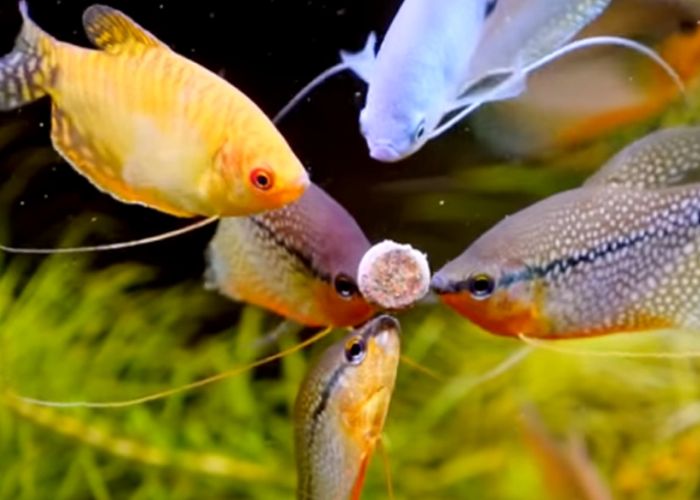What Food is Best for Tropical Fish? A common sight in aquariums are tropical fish, which can display a rainbow of colours due to their diverse range of species. These intriguing creatures need more than just a good aquarium to remain healthy.
The food of tropical fish is the single most important factor in maintaining their health, vitality, and vivid colours. Everything you ever wanted to know about tropical fish nutrition will be covered here. Let’s rea below What Food is Best for Tropical Fish”:-
Table of Contents
Understanding the Dietary Needs of Tropical Fish:
Each tropical fish species has its own specific ecological niche and dietary requirements. You can better care for these creatures if you know what their natural food is. Tropical fish are either herbivores, carnivores, or omnivores, depending on what they eat.
Herbivores: Tropical herbivorous fish rely mostly on plant sources for their nutrition. Aquatic plants, algae, and veggies make up most of their diet. Lots of fish, including tetras, catfish, and plecos, get their nutrition from plants.
Carnivores: The tropical fish known as carnivores primarily consume flesh. Crabs, insects, and small fish could make up their natural food. Many betta, cichlid, and tetra species rely on fish as a food source.
Omnivores: Some fish, known as omnivores, can eat both plants and animals. Omnivores comprise tropical fish. Gouramis, angelfish, and barbs are all examples of omnivore fish.
Selecting High-Quality Commercial Fish Food:
Commercial fish food for tropical fish must be meticulously prepared to mimic the fish’s natural diet due to the fish’s specific dietary needs. You should base your search for tropical fish food on these factors:
Ingredients:
When looking for fish food, look for fresh, natural ingredients like spirulina, fish meal, and prawn meal. Protein and other nutrients abound in these foods.
Dietary restrictions include avoiding foods that are high in fillers, artificial colours, and preservatives.
Protein Content:
Species of tropical fish may have substantially different protein requirements. Protein needs are often lower in herbivores compared to carnivores.
The protein content of tropical fish food should be tailored to the specific kind of fish being fed.
Formulation for Herbivores, Carnivores, and Omnivores:
Be careful to get fish food that caters to your fish’s individual dietary requirements. Many different kinds of food are available, so herbivores, carnivores, and omnivores can all eat well.
Pellets vs. Flakes:
The size of your fish should be considered before choosing between flakes and pellets. Flakes are more appealing to tiny fish, while pellets are more appealing to larger fish when given the choice.
Supplementary Treats:
Feeding your fish a combination of live and freeze-dried foods can be really beneficial. In addition to giving them a nutritional boost, this can mimic the conditions they would encounter in nature.
Best Foods for Specific Types of Tropical Fish:
Cichlids:
varied cichlids can have very varied diets. To keep cichlids active and healthy, you can mix high-quality cichlid pellets and flakes with brine prawns or bloodworms added occasionally.
Tetras:
A balanced and diverse diet is ideal for tetras because they are omnivores. To spice things up, mix in some high-quality pellets and flakes with some little frozen or live things, such daphnia and brine prawns.
Bettas:
Betta fish require a diet high in protein since they consume meat. This active fish relies on a diet of betta pellets, premium betta flakes, and a few strange treats, like bloodworms.
Gouramis:
Gouramis are omnivores at heart, thanks to their adaptable eating habits. To keep them in peak condition, you feed them a combination of premium flakes, pellets, and, for something truly out of the ordinary, mosquito larvae or daphnia.
Angelfish:
The ideal food for angelfish consists of a combination of marine and terrestrial creatures. Supplement their premium pellets and flakes with freeze-dried brine prawns or bloodworms to round out their diet.
In conclusion:
It is crucial to feed tropical fish the best food available if you want your aquarium to stay healthy. By understanding the specific nutritional needs of fish and providing them with high-quality commercial fish food, owners may boost their aquatic pets’ health and vitality and increase their lifespan.
A fish can adapt to its environment with the help of careful observation of its behaviour and, if necessary, dietary adjustments. To make their meals more interesting from time to time, you can add snacks. Tropical fish, when given the attention they need, can flourish and even enhance the aesthetic value of your aquarium. I hope you like reading “What Food is Best for Tropical Fish?”

Lena Whitmore is the lead writer at FishClans.com, bringing over 10 years of fishkeeping expertise and a master’s degree in Marine Biology to the site. Her extensive knowledge and practical tips have established her as a respected authority in the aquarist community. Lena’s work has appeared in leading publications and she frequently speaks at industry events.
Connect with Lena and FishClans on Facebook, Pinterest, and Instagram.

